Top 10: Sustainable Transport and Logistics Companies
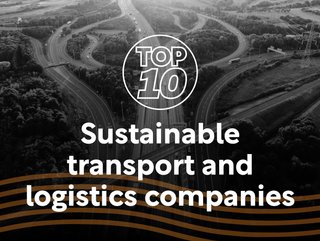
While there is no denying the crucial role the logistics and transport sector plays in global trade, the industry is a significant contributor to environmental damage – responsible for just over one-third of global carbon dioxide emissions.
This makes it the largest-emitting sector in numerous developed countries – and that keeps growing.
Demand for urban last mile delivery is expected to grow by 78% by 2030, leading to 36% more delivery vehicles in the world’s top 100 cities. This exponential growth in delivery services is further compounded by the rapid expansion of e-commerce.
Responsibility for action lies with the entire industry involved in the journey of product, from shipping firms to delivery companies, airlines to retailers.
And while there are numerous challenges from this hard-to-abate sector, many companies are tackling their carbon footprint with strategies that deliver greener modes of transportation and more sustainable supply chains – from optimising routes to digitising logistics, electrifying freight fleets to solar-powering logistic facilities.
From delivery giants like UPS and DHL to major retailers with huge logistics networks such as IKEA and Amazon, these 10 companies are making good on the future of the planet with ambitious targets and innovative strategies.
The top 10 is ranked by number of employees.
1
Amazon
Employees: 798,000
Revenue: US$513.98 billion
CEO: Andy Jassy
HQ: Seattle, US
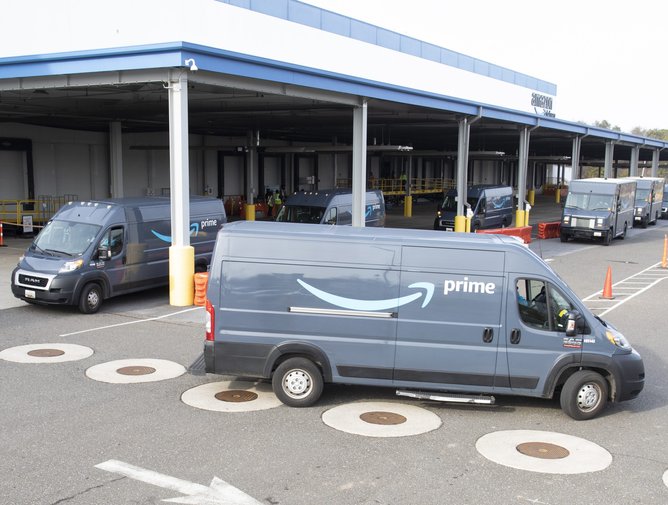
The world’s fifth largest company in 2023, with a market valuation of US$1.519 trillion, per Forbes, Amazon is best known as a retailer – but is being seen more recently as a huge logistics operation.
In 2023, Amazon was reported to have delivered an estimated 5.9 billion packages in the US, according to the Wall Street Journal, a 13% increase on 2022 and more than both UPS and FedEx – making it the largest private carrier in the US.
With an ambition to compete with delivery companies by boosting its own logistics services, the Seattle-based company has doubled the size of its network over the last few years.
Amazon relies on a complex transportation network to get products from manufacturers and sellers to customers around the globe and its logistics network spans every step of the journey, from global transportation between factories and ports, to last-mile delivery.
In greening its logistics, Amazon has committed to decarbonising transportation across its business by not only increasing fleet efficiency, but expanding the use of low-carbon fuels, and scaling electric and alternative-fuel vehicles.
When it comes to international transportation, Amazon is reducing reliance on air freight and increasing use of ocean freight, as it has a lower carbon intensity – and with shipping, has committed to using biofuels.
As a founding member of the First Movers Coalition to lead decarbonisation of the maritime shipping industry, Amazon is committed to using ships with zero-emission fuels for at least 10% of the volume of its goods shipped internationally by 2030 and 100% by 2040.
In moving shipments between Amazon facilities, to fulfilment centres, sort centres, and delivery stations, Amazon is experimenting with ways to decarbonise trucking – and in 2023 began working with renewable fuels tech company Infinium to power its trucking fleet with ultra-low-carbon electro fuels.
The e-commerce giant is also trialling battery-electric trucks, and even hydrogen-powered trucks.
Finally, when it comes to last-mile transportation, from delivery station to customer, Amazon is looking to EV delivery vehicles, electric cargo bikes and on-foot options.
In 2019, the company made history with the largest-ever order of EV delivery vehicles, acquiring 100,000 custom EVs from Rivian, which began rolling out across the US in 2021 making deliveries in more than 800 cities and regions across the US.
While in Europe and India, Amazon is using everything from EVs to e-cargo bikes to e-rickshaws, opening microbility hubs (centrally located delivery stations) to bring packages to customers more sustainably.
In Europe, there are microbility hubs across 33 cities with plans to invest €1 billion to double its European zero-emissions fleet for middle- and last-mile deliveries over the next five years.
Along with its own logistics and transportation, Amazon is forming ongoing cross-country partnerships in the shift toward lower-carbon solutions.
2
DHL Group
Employees: 504,000+
Revenue: US$17.49 billion
CEO: Tobias Meyer
HQ: Bonn, Germany
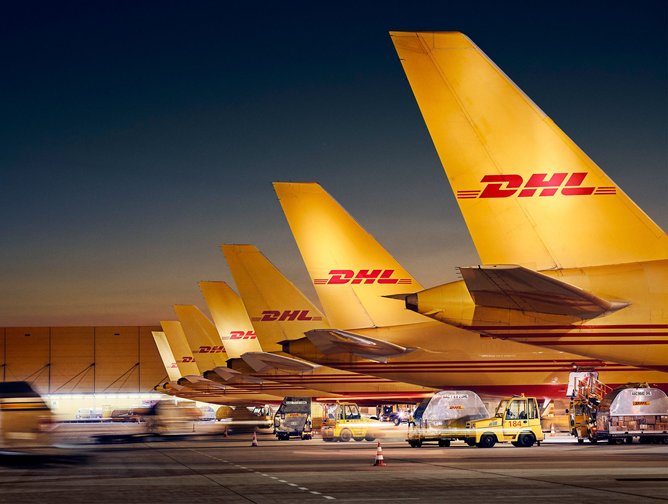
As the most international company in the world with operations in over 220 countries and territories, delivering on sustainability is no mean feat.
But DHL Group is delivering.
The industry’s first logistics company to commit to a net-zero-emissions target (2050), DHL Group is looking to reduce its GHG emissions from 39 tonnes CO2 to under 29 million by 2030.
With around 90% of its carbon footprint coming from its air network, the company is focused on exploring sustainable air transportation solutions and is looking to become a leader in sustainable aviation.
Partnering with bp, Neste and World Energy, DHL Group plans to use Sustainable Aviation Fuel (SAF) in a blend of 30% for all air transport by 2030.
According to John Pearson, CEO of DHL Express, using SAF is a “very important step in our decarbonisation journey, both for our own clean operations commitment and for reducing the emissions footprint of transported goods for our customers”.
In 2023, DHL Express set up the GoGreen Plus programme using CO2-insetting and SAF to enable customers to reduce CO2 emissions associated with their freight. Among customers, luxury e-commerce platform Mytheresa is the first and largest e-commerce platform to invest in the programme.
But the Group isn’t just relying on SAF and is investing in the latest technology of most fuel-efficient and alternative power solutions. They are also utilising technology to improve flight operational efficiency and electrifying ground handling equipment.
Among the many measures taken in greening last mile and line haul, DHL Group is on track to electrify 60% of its last-mile delivery vehicles by 2030 and is further rolling out green delivery modes such as bicycles, e-bikes and parcel lockers.
Delivering carbon neutral buildings is also part of the DHL Group plan and the company is leveraging the latest green technologies to slash emissions across its warehouses, sorting centres, hubs, terminals and office buildings.
The plan? To roll out sustainable energy sources or heating to more than 50% of buildings and increase share of green electricity to more than 90% by 2030.
3
UPS
Employees: 377,640+
Revenue: US$58.23 billion
CEO: Carol B. Tome
HQ: Atlanta, US
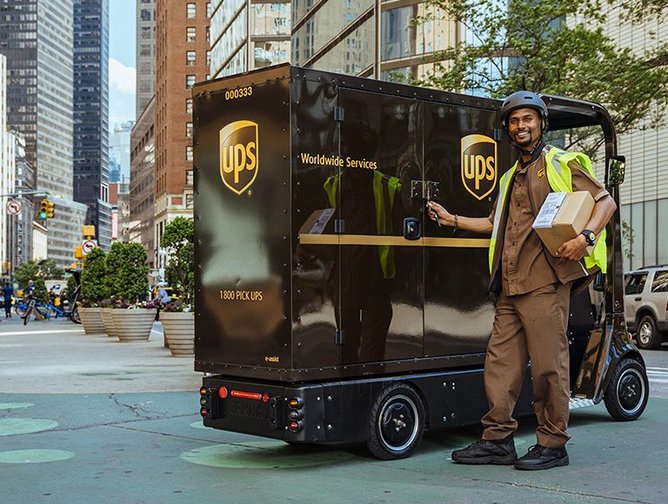
The story of the founding of UPS sounds a century before its time. Two teenage entrepreneurs started what would become this global parcel delivery service with just US$100 way back in 1907.
Today, the figures are considerably larger. Nowadays, more than half a million employees (UPSers) deliver more than 24 million packages every day, in more than 200 countries and territories.
Such coverage comes with a significant footprint, and UPS is working hard to achieve ambitious goals, ultimately to achieve carbon neutrality in all operations by 2050.
That work is already well underway, with sensible, staggered targets. By 2025, UPS aims to have 25% renewable electricity powering its facilities, and had achieved 8% by 2022. It also aims to use 40% alternative fuel in ground operations (26.5% achieved).
By 2035, it will be 100% renewable electricity for facilities, 30% sustainable aviation fuel usage, and an impressive 50% reduction in CO2 per package delivered globally (based on a 2020 baseline).
The fact that UPS’ global fleet includes more than 1,000 electric and plugin hybrid electric vehicles on the road should come as no surprise given the company has been driving EVs since the 1930s. The modern fleet includes more than 15,600 alternate fuel and advanced technology vehicles.
Those vehicles run on 162 million gallons of alternative fuels.
Renewable energy for facilities was generated from rooftop solar arrays installed on some buildings and the procurement of renewable electricity.
In total, decarbonisation efforts across the entire global supply chain resulted in a 6.9% decrease in scope 1, 2 and 3 emissions.
Sustainability is not just about CO2 emissions, of course, and The UPS Foundation invests in communities with a view to improving the lives of a billion people by 2040.
UPS will deliver social impact through an unswerving commitment to diversity, equity and inclusion (DEI), volunteerism, and charitable giving via the UPS Foundation.
UPS also aims to have 30% women in management roles and 40% ethnically diverse management by 2025 – goals that have almost been achieved (27% and 37% in 2022 respectively). Let’s not also forget that CEO Carol B. Tomé, appointed in 2020, is the company’s first female boss.
Add in 28 million trees planets since 2012 and you’d have to say that UPS is delivering on its pledges.
4
FedEx
Employees: 374,000+
Revenue: US$39.30 billion
CEO: Raj Subramaniam
HQ: Memphis, US
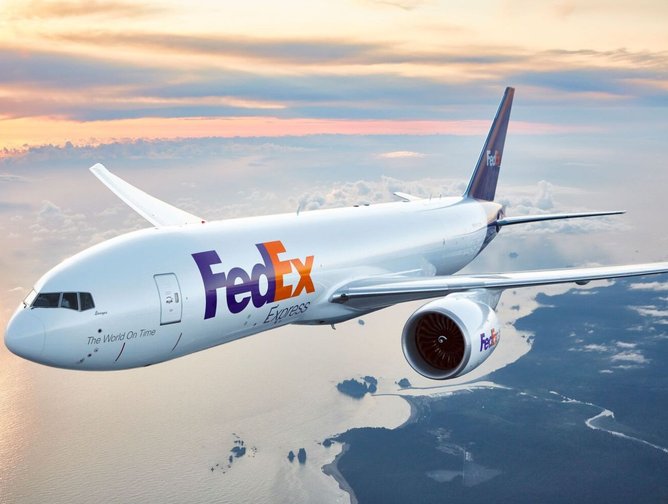
Describing its Priority Earth initiative as its most important delivery yet, FedEx has set a goal to be carbon neutral by 2040.
Carbon neutral operations fall under four pillars – vehicle electrification, sustainable fuels, fuel conservation and aircraft modernisation, and facilities.
FedEx was an EV pioneer, with FedEx Express introducing the first all-electric delivery truck in the USm in 2010. Now, the target is to have 50% of global FedEx Express pickup and delivery vehicles electric by 2025, and 100% by 2030
The company strives to improve the availability and affordability of low-carbon fuels and has set a target of 30% jet fuel from alternative sources by 2030.
Fuel conservation and aircraft modernisation are key to decarbonisation efforts and FedEx has updated its fleet and in 2022 saved 150 million gallons of jet fuel from such initiatives.
Despite EVs putting an extra burden on energy demand, FedEx facilities are being constantly enhanced and Scope 2 emissions reduced, thanks primarily to solar power generation across 29 sites globally.
Carbon sequestration is also being explored, with FedEx pledging US$100 million towards the Yale Center for Natural Carbon Capture in 2021.
FedEx continues to drive sustainability initiatives across the world, from increasing the use of EVs to generating solar energy on-site.
For instance, in 2022 the company built a solar canopy at the FedEx Ground headquarters in Pittsburgh, which produces around 30% of the power used on campus.
In China, FedEx operates 250 EVs and planned to increase that to 460 vehicles in 2023.
A new FedEx Express facility in South Africa uses sustainable technologies to save energy via motion-activated lighting, and also capture rainwater.
Over its 50-year history, FedEx has been proud of its culture than puts people first. It values diversity, equity, and inclusion (DEI) as essential to its success.This was demonstrated with all FedEx Office leaders and key HR employees completing a year-long Inclusive Leadership program to address critical DEI topics in 2022.
The stats don’t lie. In 2022, 27% of global management were women, and 33% of the Board. On top of that, 36% of management employees in the US are minorities.
FedEx recognises that its success is down to its ESG commitments, strategies, and goals, and the need to deliver positive value and experiences for customers. FedEx calls it the Purple Promise – to make every FedEx experience outstanding.
5
IKEA (Ingka Group)
Revenue: US$45.9 billion
Employees: 231,000
CEO: Jesper Brodin
HQ: Delft, Netherlands
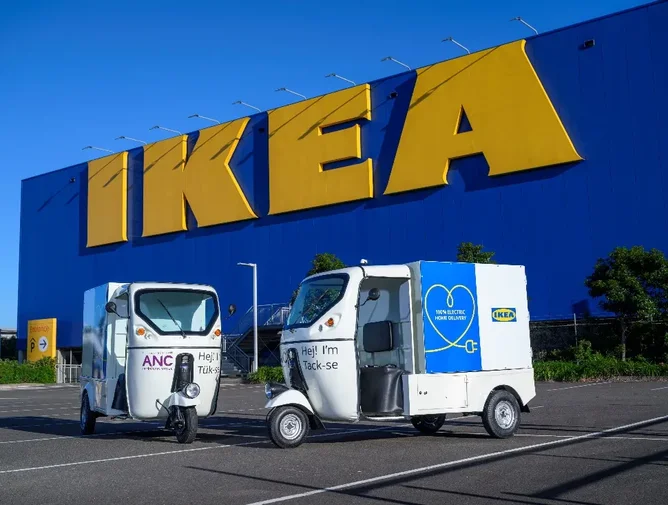
Like any manufacturer or retailer, products must on a journey – from supplier to distribution centre to store to home, a journey which has an impact on the planet.
And as the manufacturer and retailer of multi-millions of products each year (IKEA retail sales reached €44.6 billion in FY22), operator of more than 470 stores across 63 markets, IKEA is well-aware of its impact.
IKEA Supply Chain Operations manages two million shipments every year – and this will only rise as the demand for home furnishing products continues to rise.
As such, the Swedish furniture giant is working hard to decarbonise its transport and logistics, rethinking everything – from the materials used for making products, to energy consumption of its logistics operations, to how its products are moved through the supply chain.
With an ambitious goal to be climate positive by 2030, which means to reduce more GHG emissions than the IKEA value chain emits – IKEA has committed to reducing the carbon footprint from every transport they use by an average of 70% – and by 80% from all logistics operations.
To achieve this, the company has identified Reduce, Replace and Rethink as three pillars of its decarbonisation journey for the highest impact.
As Elisabeth Munck, Head of Sustainability at IKEA Supply Chain Operations, puts it: "We have created a diversified portfolio of initiatives and solutions, short- and long-term simultaneously, with the same sense of urgency. We want to engage with others and collaborate to find better solutions, advocate policy change, and take further actions,"
And its sustainability journey is already having an impact. According to IKEA’s Sustainability Report FY22, the climate footprint of the IKEA value chain reduced by 12% in FY22, compared to the baseline FY16.
Product transportation makes up 4.9% of IKEA’s climate footprint, while customer travel and home deliveries 8.1% – and IKEA’s goal is to reduce absolute GHG emissions from product transport and from customer travel and home deliveries by 15% and 50%, respectively.
In 2023, the company also committed to zero emission heavy-duty road transports by 2040 through EV100+, meaning all product transport and home deliveries will be zero-emission.
Among fuel and energy consumption reduction strategies, IKEA is optimising its transport network by hauling longer and multiple trailers, switching from fossil fuels to renewable energy or more sustainable fuels, electrifying its freight fleets and embedding new technologies into its value chain.
For example, IKEA has reduced CO2 emissions in transportation in Finland by using trucks that carry two high-capacity containers, rather than one.
In terms of last-mile deliveries, IKEA has around 30 different solutions, including in parts of Germany and Italy where electric cargo bikes are used for narrow streets, or in Australia where tuk tuks are being used for larger cities. IKEA India has made a significant stride towards sustainability by reaching its customer via electric three-wheelers across seven cities.
And last year, IKEA France introduced an innovative boat delivery system for customers in Paris, using the river Seine as a transportation route with EVs to perform the last mile – a method emitting up to five times less CO2.
IKEA has also increased its renewable electricity share for retail and other operations to 76% compared to 71% in FY21, achieving 100% renewable electricity in Austria and Spain.
6
A.P. Moller – Maersk
Employees: 83,500+
Revenue: US$50.34 billion
CEO: Vincent Clerc
HQ: Copenhagen
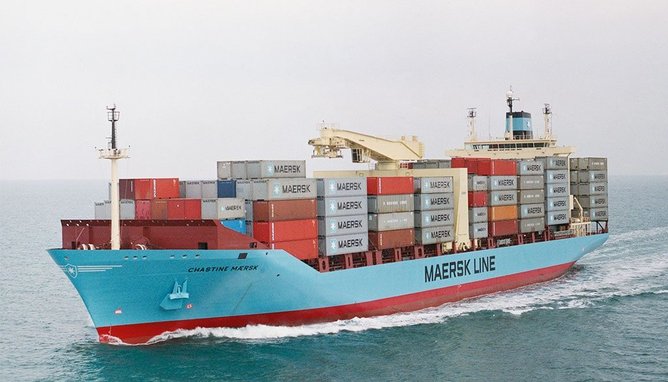
Contributing around 1% of the total of transport and logistics 3.5 billion tonnes of CO2 every year, shipping giant Maersk has been an industry leader in the climate response committing to decarbonise shipping operations 10 years early, by 2040.
Maersk is also developing scalable solutions to help the entire sector reduce its footprint, from its green fuel partnerships to scale availability to its ECO Delivery product (see below).
Most of its emissions derive from fossil fuel-powered ocean transport services, which means Maersk is focused on driving the transition to green fuel options – with plans to have 25% of cargo transporting with green fuels by 2030.
Maersk’s policy is to only use second-generation bio-diesel. Derived from waste as residue as feedstocks, biofuels have significant impact potential and are already power the company’s fleet.
These biofuels are also sold to customers under the Maersk ECO Delivery label, a fossil fuel substitute service, which continues year-on-year growth, with more than 200 customers now on board.
Bio-methanol and e-methanol along with green ammonia are also being explored as alternative fuel types.
Along with alternative fuels, Maersk is greening its ships – and in 2021, became the first container shipping company to order methanol-enabled vessels. The following year, they ordered an additional six large ocean-going veseels that can sail on green methanol. Built by Hyundai Heavy Industries, this brings the total number o dual-fuel methanol engine vessels in Maersk’s order books to 19.
Through nine recently announced strategic green fuel partnerships, Maersk has laid the groundwork or its mission to secure 5 million tonnes of green methanol by 2030.
Climate-efficient retrofits are also part of the company’s decarbonisation strategy, with implementation in progress on around 40 vessels.
7
XPO Logistics
Employees: 38,000
Revenue: US$7.7 billion
CEO: Mario Harik
HQ: Connecticut, US
A leading global provider of end-to-end logistics solutions, XPO Logistics is one of the largest providers of asset-based less-than-truckload (LTL) freight transportation in shipping in North America.
Together with its business in Europe, XPO serves provides some 50,000 customers with cutting-edge supply chain solutions including last-mile delivery and global forwarding – using a network of 550 locations.
XPO has committed to carbon neutrality by 2040, and net zero emissions by 2050. In the UK, the company recently turned its main distribution centre completely carbon neutral six months ahead of schedule.
Through its decarbonisation strategy, XPO has committed to reduce CO2 emissions by at least 20% over a maximum period of five years, doing its part to make the logistics and transport sector more efficient and sustainable.
From fleet management and route optimisation to energy efficiency in its facilities, the company has implemented numerous innovative initiatives to reduce its carbon footprint.
Investments in greener technologies include the recently launched Low Emissions Sustainable Solution (LESS), an innovative solution that enables the replacement of hydro-treated vegetable oil (HVO) – which claims to reduce CO2 emissions by up to 90%, instead of diesel fuel in XPO's fuel supply.
XPO is increasingly using HVO in its transport network to align with its net-zero goal and in 2023, during the Tour de France, the company used 49,000 litres of HVO to transport equipment and supplies for the race.
This initiative also gives customers a way to replace diesel with a more sustainable fuel supply.
Bruno Kloeckner, XPO’s Managing Director – France, said: "We are proud to introduce the LESS programme, which illustrates our capacity for innovation with decarbonisation, both for our company and our customers. Fuel-efficient solutions are in high demand in response to the importance customers are placing on climate actions. We believe that the future of sustainable road transport is linked to a non-traditional, multi-energy mix supported by all parties.”
What’s more, XPO’s fleet has incorporated P400 trailers to expand its capacity for multimodal transport services – these trailers reduce emissions by combining road and rail from the Iberian Peninsula to key areas across Europe.
The company also introduced a carbon-offset shipping option for customers of its truck brokerage business in North America. The Ship Net-Zero with XPO Programme gives shippers a way to negate the carbon footprint of their freight by purchasing carbon offsets for the sustainability project of their choice.
XPO has been named among the World’s Most Admired Companies by Fortune Magazine for six consecutive years and among America’s Most Responsible Companies by Newsweek.
8
Evri (formerly Hermes)
Employees: 31,700
Revenue:
CEO: Martjin de Lange
HQ: Leeds, UK
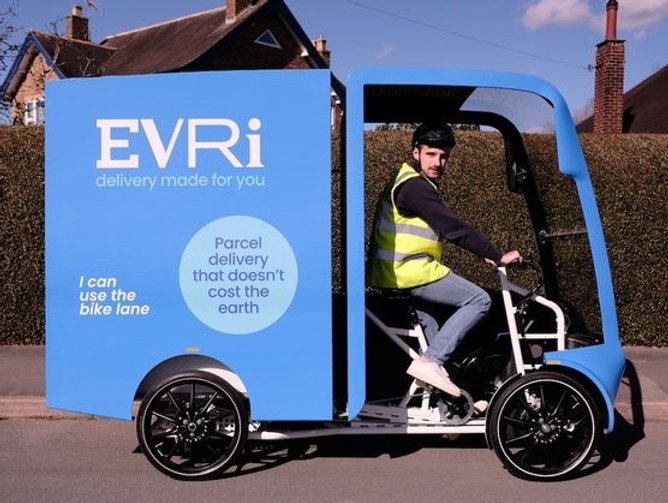
The delivery company, formerly known as Hermes, delivers 730 million parcels each year, serving 12 million customers a week using 24,000 self-employed couriers, five hubs, 27 depots and 550 delivery units.
Headquartered in the UK, where it works with more than 80% of UK retailers, the company has expanded internationally too – in the US and mainland Europe.
The business is growing rapidly, with 400 more warehouses and offices added YoY.
With a target of net zero by 2035 for direct and indirect emissions – Evri is reducing carbon emissions across operations by focusing on vehicles, infrastructure, and innovative products and services – and by using the latest technology to measure and review.
Evri has achieved a 10% reduction of carbon per parcel since 2022 and reduced its operational carbon by almost a third in the last two years.
Across buildings (hubs, depots and delivery units), Evri is now 100% powered by renewables having converted all of its purchased energy to REGO-backed UK renewables. Among eco-features in its network, solar panels flank its flagship ‘superhub’ in the UK, while its Rugby hub features a rainwater harvesting system.
On the transportation front, ongoing exploration of alternative fuels for its fleet has put Evri in a leading position across first, middle and final mile as it powers towards net-zero.
Using a biomethane compressed natural gas (CNG) courtesy of CNG Fuels, more than half of Evri’s first mile fleet is powered by bio-CNG (sourced from food waste) – with each of its 190 Bio-CNG tractor units reducing CO2 emissions by more than 80% when compared to a Euro 6 diesel vehicle. What’s more, one-third of its entire core fleet is low-carbon.
Furthermore, Evri’s London Gemini site operates with 100% EVs to service final-mile deliveries in central London and in 2022/2023, the company doubled the number of zero-emission electric vans bringing the total to 37% of its total van fleet.
Among other innovations in reaching net zero 2035, Evri is rolling out e-cargo bikes into its network across four UK cities, has deployed geofencing and ‘Parcel Vision’ technology to improve first-time delivery rates, and opened ParcelShops and Lockers reducing a parcel’s carbon footprint by an average 45%.
9
DPD / Geopost
Employees: 56,739
Revenue: US$17.08 billion
CEO: Yves Delmas
HQ: Issy-les-Moulineaux, France
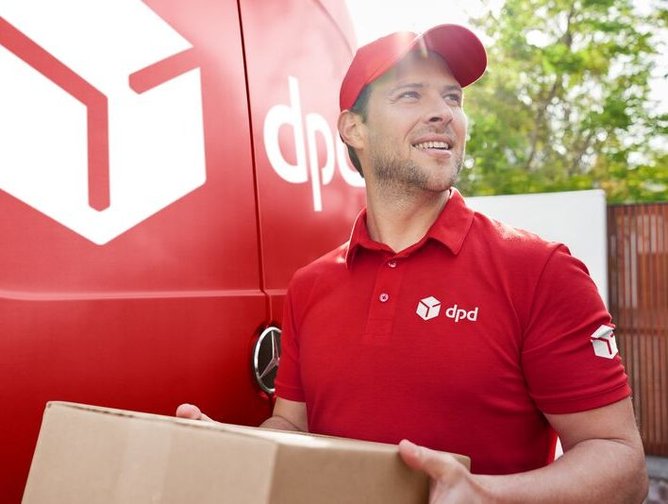
DPD is part of Geopost, the second-largest postal group in Europe, with 56,739 employees, and operating over 10,000 vehicles from 83,000 pickup points worldwide in 50 countries, with 122,000 delivery experts delivering 8.4 million parcels worldwide each day. DPD is one of the Geopost brands.
Among its 84 locations, DPD’s 33-acre Superhub in Hinckley, UK, is the largest of its kind in Europe – sorting up to 72,000 parcels per hour.
With a reputation for being the most innovative carrier in the express parcels sector, DPD is also innovating on the sustainability front as it looks to reach net zero by 2040. Geopost/DPD became the first parcel delivery company to have both near- and long-term SBTis approved.
Along with reducing its carbon emissions by 90% by 2040 at the latest, DPD will compensate the remaining 10% through projects that remove carbon dioxide from the atmosphere.
“From 2024, we will therefore accelerate our actions to reduce our carbon emissions,” DPD said in its sustainability report.
Recognising that most CO2 emissions are caused by transport, DPD is accelerating investments to make its fleet cleaner. A founding member of Climate Group’s EV100+ initiative, the company is electrifying its first and last mile delivery fleet with plans to increase the share of alternative solutions (EV, cargo bikes and delivery on foot) to 85% by 2030 and 100% by 2035.
Not just this, DPD is diversifying its linehaul leet to include alternative powertrain technologies such as electric, hydrogen, biogas and biofuel powered trucks, as well as shifting more parcels to rail to increase the share of alternative linehaul solutions to 50% by 2030.
Switching to renewables to power company infrastructure is on track to achieve 70% renewables by 2030.
Alongside its commitment to achieving net zero, the Group is spearheading fully low-emission deliveries in 350 cities across Europe by 2025. This ambitious goal will see them reach 110 million Europeans, switch to 15,000 alternatively powered vehicles, establish 250 urban depots, install 6,700 electric charging points, and cut GHG emissions by 83% and pollutants by 95%.
By the end of 2022, Geopost/DPD had enabled 97 cities with fully low-emission deliveries with a further 251 cities in transition; as well as deploying 8,458 alternative vehicles, setting up 154 urban depots, and fitting 3,776 electric charging points.
To help customers gain better visibility of the emissions generated by their supply chains, Geopost developed its own carbon calculator, a “pioneering tool, built in line with international carbon accounting standards, designed to help businesses meet the need for accurate CO2 emissions reporting and help them make more sustainable decisions in the long-term”, says Jean-Claude Sonet, EVP, Marketing, Communications CSR, Geopost.
10
Brambles
Employees: 12,000+
Revenue: US$12.77 billion
CEO: Graham Chipchase
HQ: Sydney, Australia
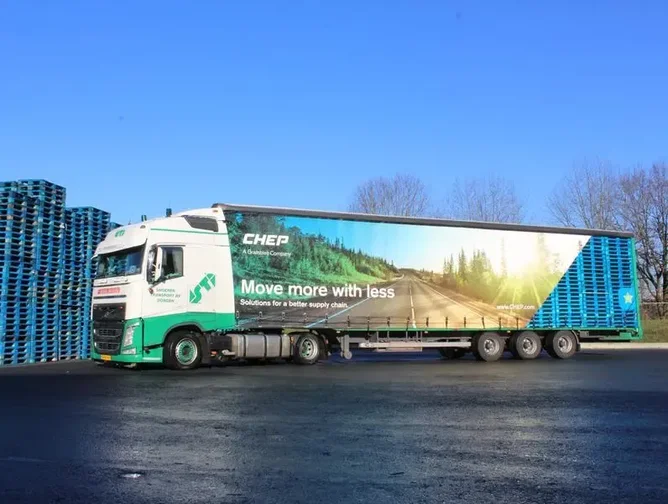
Established in 1875, Brambles is a global leader in supply chain solutions. Operating under the CHEP brand, the company helps to move more goods to more people, in more places than any other organisation on the planet.
Pretty impressive then that the company is also one of the kindest to the planet,
recently ranking as the world’s third most sustainable company in Corporate Knights’ Global 100 and eighth most sustainable in Sustainability Magazine’s prestigious Top 100 Companies 2023.
With a net-zero by 2040 commitment across the entire value chain, Brambles has delivered a decarbonisation roadmap with validated SBTis that targets 17% reduction in Scope 3 by 2030. The company has already delivered carbon neutrality for Scope 1 and 2 emissions with 100% electricity powered by renewable sources.
Recognising that transport is an increasingly problematic source of emissions for businesses, Brambles set up the CHEP Transport Collaboration initiative and using the company’s unique scale, reach and data, they collaborate with customers on transport solutions – cutting empty transport miles, wasted fuel and CO2 emissions from their supply chain.
So far, the results are impressive, saving 6.6 million km of empty truck journeys and avoiding 6,500 tonnes of CO2 emissions. This includes helping Danone Waters, whose supply trains from the UK to France were returning empty. By filling this space, Brambles generated a new revenue stream for Danone.
Deployment of alternative fuels is another area of focus, as is investment in zero emissions transport technologies such as electric and hydrogen.
As well as leading in carbon productivity, Brambles is building a circular model as it looks to pursue a regenerative vision – helping to decarbonise customers’ supply chains.
Its circular business model facilitates the ‘share and reuse’ of the world’s largest pool of reusable pallets and containers, enabling Brambles to serve its customers while minimising impact on the environment.
Not just that, but as a leading example of a successful circular business model operating at a global scale economy, Brambles looks to advocate, educate and impact one million people to become circular economy change-makers.






